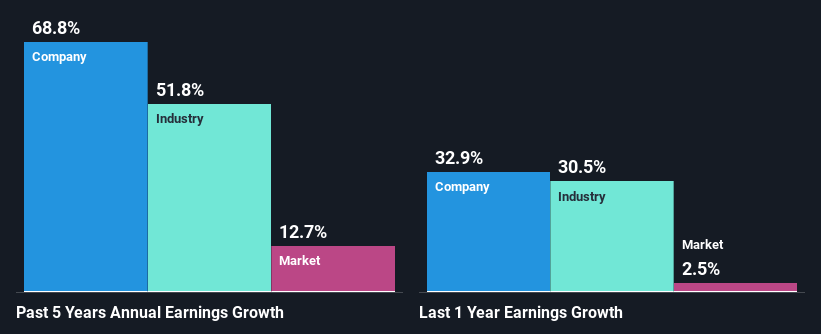- United States
- /
- Energy Services
- /
- NasdaqGS:BKR
Are Strong Financial Prospects The Force That Is Driving The Momentum In Baker Hughes Company's NASDAQ:BKR) Stock?

Baker Hughes' (NASDAQ:BKR) stock is up by a considerable 22% over the past three months. Since the market usually pay for a company’s long-term fundamentals, we decided to study the company’s key performance indicators to see if they could be influencing the market. In this article, we decided to focus on Baker Hughes' ROE.
Return on equity or ROE is an important factor to be considered by a shareholder because it tells them how effectively their capital is being reinvested. Put another way, it reveals the company's success at turning shareholder investments into profits.
Check out our latest analysis for Baker Hughes
How Is ROE Calculated?
Return on equity can be calculated by using the formula:
Return on Equity = Net Profit (from continuing operations) ÷ Shareholders' Equity
So, based on the above formula, the ROE for Baker Hughes is:
14% = US$2.3b ÷ US$16b (Based on the trailing twelve months to September 2024).
The 'return' is the income the business earned over the last year. Another way to think of that is that for every $1 worth of equity, the company was able to earn $0.14 in profit.
Why Is ROE Important For Earnings Growth?
Thus far, we have learned that ROE measures how efficiently a company is generating its profits. Based on how much of its profits the company chooses to reinvest or "retain", we are then able to evaluate a company's future ability to generate profits. Assuming all else is equal, companies that have both a higher return on equity and higher profit retention are usually the ones that have a higher growth rate when compared to companies that don't have the same features.
Baker Hughes' Earnings Growth And 14% ROE
At first glance, Baker Hughes seems to have a decent ROE. Further, the company's ROE is similar to the industry average of 14%. This probably goes some way in explaining Baker Hughes' significant 69% net income growth over the past five years amongst other factors. However, there could also be other drivers behind this growth. Such as - high earnings retention or an efficient management in place.
As a next step, we compared Baker Hughes' net income growth with the industry, and pleasingly, we found that the growth seen by the company is higher than the average industry growth of 52%.

Earnings growth is an important metric to consider when valuing a stock. It’s important for an investor to know whether the market has priced in the company's expected earnings growth (or decline). This then helps them determine if the stock is placed for a bright or bleak future. Is BKR fairly valued? This infographic on the company's intrinsic value has everything you need to know.
Is Baker Hughes Using Its Retained Earnings Effectively?
Baker Hughes' three-year median payout ratio is a pretty moderate 40%, meaning the company retains 60% of its income. This suggests that its dividend is well covered, and given the high growth we discussed above, it looks like Baker Hughes is reinvesting its earnings efficiently.
Besides, Baker Hughes has been paying dividends over a period of seven years. This shows that the company is committed to sharing profits with its shareholders. Upon studying the latest analysts' consensus data, we found that the company's future payout ratio is expected to drop to 29% over the next three years. However, the company's ROE is not expected to change by much despite the lower expected payout ratio.
Conclusion
On the whole, we feel that Baker Hughes' performance has been quite good. Specifically, we like that the company is reinvesting a huge chunk of its profits at a high rate of return. This of course has caused the company to see substantial growth in its earnings. With that said, the latest industry analyst forecasts reveal that the company's earnings growth is expected to slow down. Are these analysts expectations based on the broad expectations for the industry, or on the company's fundamentals? Click here to be taken to our analyst's forecasts page for the company.
Valuation is complex, but we're here to simplify it.
Discover if Baker Hughes might be undervalued or overvalued with our detailed analysis, featuring fair value estimates, potential risks, dividends, insider trades, and its financial condition.
Access Free AnalysisHave feedback on this article? Concerned about the content? Get in touch with us directly. Alternatively, email editorial-team (at) simplywallst.com.
This article by Simply Wall St is general in nature. We provide commentary based on historical data and analyst forecasts only using an unbiased methodology and our articles are not intended to be financial advice. It does not constitute a recommendation to buy or sell any stock, and does not take account of your objectives, or your financial situation. We aim to bring you long-term focused analysis driven by fundamental data. Note that our analysis may not factor in the latest price-sensitive company announcements or qualitative material. Simply Wall St has no position in any stocks mentioned.
About NasdaqGS:BKR
Baker Hughes
Provides a portfolio of technologies and services to energy and industrial value chain worldwide.
Flawless balance sheet and good value.
Similar Companies
Market Insights
Community Narratives



